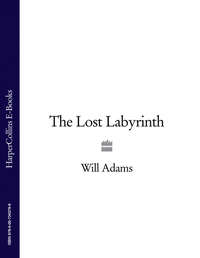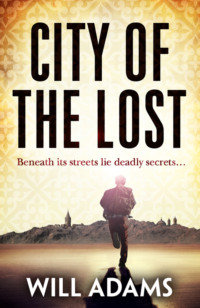
Полная версия
The Alexander Cipher
III
Nessim had been on the go all night, working furiously to catch Knox before Hassan woke. But he’d failed. He’d received his summons fifteen minutes ago, and now here he was, clenching a fist to steel himself before knocking on his boss’s bedroom door at Sharm’s medical centre.
Nessim had joined the Egyptian Army at the age of seventeen. He’d become a paratrooper, one of the elite. But a twisted knee had put an end to hopes of active service, so he’d resigned his commission through boredom and had become a mercenary in the endless African wars. A mortar round had landed fizzing in his lap, yet hadn’t exploded; instead, it had convinced him that it was time for a change of pace. Back in Egypt, he’d made a name for himself as a bodyguard before being recruited by Hassan as his head of security. If he’d scared easily, Nessim would never have survived such a life. But there was something about Hassan that scared him. Having to report bad news scared him.
‘Come in,’ muttered Hassan. His voice was softer than usual, and a little wheezy. He’d lost a tooth, and had suffered severe bruising of his ribs too, making breathing painful. ‘Well?’ he asked.
‘Would you please excuse us?’ Nessim asked the doctor sitting beside his bed.
‘With pleasure,’ said the doctor, a shade too emphatically for his own good.
Nessim closed the door behind him. ‘We’ve got the girl,’ he told Hassan. ‘She was going for a bus.’
‘And Knox?’
‘We almost had him. At Cairo Airport. He got away.’
‘Almost?’ said Hassan. ‘What good is almost?’
‘I’m sorry, sir.’
Hassan closed his eyes. Yelling evidently hurt too much. ‘You call yourself my head of security?’ he said. ‘Look at me! And you let the man who did this wander around Egypt like some kind of holiday-maker?’
‘You’ll have my resignation as soon as—’
‘I don’t want your resignation,’ said Hassan. ‘I want Knox. I want him here. Do you understand? I want you to bring him to me. I want to see his face. I want him to know what he’s done and what’s going to happen to him because of it.’
‘Yes, sir.’
‘I don’t care what it takes. I don’t care how much you spend. I don’t care what favours you have to call in. Use the army. Use the police. Whatever is necessary. Am I clear?’
‘Yes, sir.’
‘Well?’ asked Hassan. ‘Why are you still here?’
‘With respect, sir, there are different ways to catch him. One, as you rightly suggest, is by using our contacts in the police and the army.’
Hassan squinted. He was a shrewd man, for all his wrath. ‘But?’
‘It was easy enough to secure their help last night. We simply told them that Knox had caused a serious incident on a boat but that the details were still unclear. But tomorrow and the day after, if we still want their active help, they’ll want evidence of this serious incident.’
Hassan looked at Nessim in disbelief. ‘Are you saying what he did to me isn’t sufficient evidence?’
‘Of course not, sir.’
‘Then what are you saying?’
‘So far, very few people know anything more than rumours. I picked your medical team myself. They know better than to talk. I’ve had my own people guarding your door. No one has been allowed in without my explicit permission. But if we involve the police, they’ll want to investigate for themselves. They’ll send officers to interview you and take photographs and talk to the other guests on the boat, including your Stuttgart friend and the girl. And you have to ask yourself if that would be helpful at this particular moment; or indeed whether it would be good for your reputation to have photographs of your injuries reaching the newspapers or the Internet alongside exaggerated reports of how they were incurred, which could easily happen, because we both know you have enemies as well as friends in the police. And you should also ask yourself what it would do for your personal authority if people got to see what a mere dive instructor had done to you, and that he’d managed to escape too, even if only for a little while.’
Hassan frowned. He knew the value of being feared. ‘What’s our alternative?’
‘We drop the charges. We say it was all a misunderstanding. We get the girl out. You lie low until you’ve recovered. Meanwhile, we go after Knox ourselves.’
There was a long silence. ‘Very well,’ said Hassan finally. ‘But you’re to take personal charge. And I expect results. Understand?’
‘Yes, sir. I understand entirely.’
SEVEN
I
It was Gaille’s first visit to Alexandria. There was congestion along the Corniche. The masts of fishing boats and yachts in the Eastern Harbour jangled like flamenco in a light breeze that brought with it a faint, acidic tang. She rested her head back, shielded her eyes from the early morning sun as it flickered between tall, rectangular, sun-bleached hotels, apartment blocks and offices, pocked with satellite dishes. The place was coming to life like a gigantic yawn. Alexandria had always been the late-riser of Egyptian cities. Shops were raising steel shutters, lowering canopies. Groups of portly men sipped coffees at pastry cafés and watched benignly as ragged boys and girls wended the traffic, selling packs of napkins and cigarettes. The alleys leading away from the front were tight, dark and faintly menacing. A tram already crammed with passengers paused to take on more. A policeman in a dazzling white uniform and flat cap held up his hand to divert them right. An ancient commuter train clanked and rattled with taunting slowness across a junction. Young boys played chase in the open cattle-carts.
Elena glanced pointedly at her watch. ‘You’re sure this is the right way?’
Gaille shrugged helplessly. Her only map was a crude photocopy from an outdated backpacker guidebook. Even so, she had a nagging suspicion that she must already have gone badly wrong to have ended up here, though she’d learned enough about her new boss not to admit it. ‘I think so,’ she equivocated.
Elena sighed loudly. ‘At least you could try.’
‘I am trying.’ Gaille couldn’t shake off the suspicion that she was being punished for her trespass yesterday, or was at least being opportunistically expelled from the Delta dig because of it.
They were approaching a large junction. Elena looked at her expectantly for directions. ‘Turn right,’ said Gaille.
‘Are you sure?’
‘It should be somewhere along here on the left or right.’
‘Somewhere along here on the left or right?’ snorted Elena. ‘That’s really helpful.’
Gaille leaned out her window, her brain aching from lack of sleep and coffee. There was a construction site ahead, a huge concrete high-rise with steel bars waggling like spider legs from the top. She said in desperation: ‘I think this must be it.’
‘You think this must be it; or this is actually it?’
‘I’ve never been to Alexandria before,’ protested Gaille. ‘How should I know?’
Elena huffed noisily and shook her head, but she indicated left and swung through double gates, then bumped along a rutted track. Three Egyptian men were conferring animatedly at the far end.
‘That’s Ibrahim,’ muttered Elena, with such obvious chagrin that Gaille had to fight back a smile. If Elena thought she was gloating … ! They parked. Gaille quickly opened her door and jumped down, suffering a momentary, debilitating flutter of shyness. Normally she was confident in professional situations, but she had no faith in her skills as a photographer and consequently felt a fraud. She went around to the back of the flatbed, ostensibly to check her belongings and equipment, but in truth to hide.
Elena yelled out for her. She took a deep breath to compose herself, fixed a smile to her lips, then walked around to meet them. ‘Ibrahim,’ said Elena, indicating the elegant man in the centre of the group. ‘I’d like you to meet Gaille.’
‘Our esteemed photographer! We are truly grateful.’
‘I’m not really a—’
‘Gaille’s an excellent photographer,’ said Elena, with a sharp glance. ‘What’s more, she’s an ancient languages expert too.’
‘Splendid! Splendid!’ He gestured to his two companions, who were spreading out a site map on the ground. ‘Mansoor and Mohammed,’ he said. ‘Mansoor is my right hand. He runs all our excavations in Alexandria. I couldn’t survive without him. And Mohammed is construction manager for this hotel.’
‘Pleased to meet you both,’ said Gaille.
They glanced up from their map, nodded politely. Ibrahim smiled distractedly, glanced at his watch. ‘Just one more to come. You know Augustin Pascal?’
Elena snorted. ‘Only by reputation.’
‘Yes,’ nodded Ibrahim seriously. ‘He’s a fine underwater archaeologist.’
‘That wasn’t what I meant,’ said Elena.
‘Oh.’
It was a few more minutes before an engine roared at the mouth of the site. ‘Ah!’ said Ibrahim. ‘Here he is.’
A thirty-something man cruised up the approach on a gleaming black and chrome chopper, wending potholes, bare-headed, allowing his long dark hair to flow free. He was wearing mirror shades, two days’ worth of stubble, a leather jacket, jeans, calf-high black biker boots. He rode the chopper up onto its stands, stepped off, fetched a cigarette and a brass Zippo from his shirt pocket.
‘You’re late,’ said Ibrahim.
‘Desolé,’ he grunted, shielding the flame. ‘Something came up.’
Mansoor asked wryly: ‘Sophia, I suppose?’
Augustin grinned wolfishly. ‘You know I’d never take advantage of my students like that.’
Elena clucked her tongue and muttered a Greek obscenity beneath her breath. Augustin grinned and turned to her, spreading his hands. ‘Yes?’ he asked. ‘You see something you like, perhaps?’
‘How could I?’ retorted Elena. ‘You’re standing in the way.’
Mansoor laughed and slapped Augustin on the shoulder. But Augustin himself looked unruffled. He gazed Elena up and down, then gave her a grin of frank approval, perhaps even of intent, for she was a striking-looking woman, Elena, and anger added a certain something to her colouring. Gaille winced and took half a step back, waiting for the inevitable eruption, but Ibrahim stepped between them just in time.
‘Well,’ he said, with nervous jauntiness. ‘Let’s start, shall we?’
The ancient spiral steps looked precarious. Gaille descended warily. But they all reached the bottom without alarm and gathered in the rotunda. The corner of a black and white pebble mosaic showed beneath the rubble. Gaille pointed it out in a murmur to Elena.
‘Ptolemaic,’ declared Elena loudly, going down on her haunches to brush away the dust. ‘Two fifty BC, give or take.’
Augustin pointed to the sculpted walls. ‘Those are Roman,’ he said.
‘Are you suggesting I can’t tell a Macedonian mosaic when I see one?’
‘I’m suggesting that the carvings are Roman.’
Ibrahim held up his palms. ‘How about this?’ he suggested. ‘It started as a private tomb for some wealthy Macedonian. Then some Romans discovered it three hundred years later and turned it into a necropolis.’
‘That would explain the staircase,’ admitted Elena grudgingly. ‘Macedonians didn’t usually build in spirals. Straight lines or squares.’
‘And they’d have needed to widen the shaft when they expanded it into a necropolis,’ agreed Augustin. ‘For light and ventilation, and to lower corpses, and to take out quarried stone. They used to sell it to builders, you know.’
‘Yes,’ said Elena scathingly. ‘I did know, thank you.’
Gaille was barely listening. She was staring dizzily up at the circle of sky high above her head. Christ, but she was out of her depth. An emergency excavation offered no second chances. Within the next two weeks, the mosaic and all these exquisite carvings and everything else in this place would need to be photographed. After that the place would probably be sealed for ever. Artefacts like these deserved a real professional, someone with an eye for the work, experience, sophisticated equipment, lighting. She plucked anxiously at Elena’s sleeve, but Elena obviously realised what she wanted to discuss and brushed her off, following Mohammed down the steps into the forecourt of the Macedonian tomb, the dull matt yellow of the limestone shown up by the shining white marble blocks of the façade, and the four engaged marble ionic columns and the marble entablature running across their top. The party paused for a few moments to admire, then pressed on through the half-open bronze door into the tomb’s antechamber.
‘Look!’ said Mansoor, shining his torch at the side walls. They all went closer to inspect them. There was paint on the plaster, though terribly faded. It had been common practice in antiquity for important scenes from the dead person’s life to be painted in or around their tombs. ‘You can photograph these?’ asked Mansoor.
‘I’m not sure how well they’ll come out,’ said Gaille wretchedly.
‘You must wash them first,’ said Augustin. ‘Lots and lots of water. The pigment may look dead now. But give them some water and they will spring back to life like beautiful flowers. Trust me.’
‘Not too much water,’ warned Mansoor. ‘And don’t set up your lights too close. The heat will crack the plaster.’
Gaille looked round desperately at Elena, who was studiously refusing to meet her eye. Instead she shone her torch at the inscription above the portal into the main chamber. ‘“Akylos of the thirty three,”’ said Augustin, translating from the Ancient Greek. The light vanished from the inscription at that moment, as Elena fumbled and dropped her torch, cursing so violently that Gaille glanced at her in surprise.
Ibrahim turned his own torch on the inscription instead, allowing Augustin to start his translation from the beginning. ‘“Akylos of the thirty three,”’ he read out. ‘“To be the best and to be honoured above the rest.”’
‘It’s Homer,’ murmured Gaille. Everyone turned to look at her in surprise. She felt her cheeks burn. ‘It’s from The Iliad,’ she said.
‘That’s right,’ nodded Augustin. ‘About a man called Glaucus, I believe.’
‘Actually, it comes up twice,’ said Gaille timidly. ‘Once about Glaucus and once about Achilles.’
‘Achilles, Akylos,’ nodded Ibrahim. ‘He evidently thought a great deal of himself.’ He was still staring up at the inscription when he followed Mohammed into the main chamber, so that he tripped over the low step and went sprawling onto his hands and knees. Everybody laughed as he picked himself up and brushed himself down with the self-deprecating face of the accident-prone.
Augustin went to the shield pinned to the wall. ‘The shield of a hypastist,’ he said. ‘A shield-bearer,’ he explained, when Ibrahim frowned. ‘Alexander’s special forces. The greatest unit of fighting men in the most successful army in the history of the world. Maybe he wasn’t being so boastful after all.’
II
Morning sunlight fell upon Knox’s cheek as he lay on Augustin’s couch and tried to catch up on sleep. He groaned and showed it his back, but it was no good. The day was already too sticky. He rose reluctantly, took a shower, ransacked Augustin’s room for clothes, then ground up some coffee beans for the percolator, and set it brewing. He slathered a croissant with butter and confiture de framboises, then wolfed it down as he wandered the flat looking for ways to divert himself. Egyptian TV was gruesome at the best of times, but Augustin’s flickering black-and-white portable made it completely unwatchable. And there was nothing to read except tattered newspapers and some comic books. This was not a flat for killing time in. It was a flat for sleeping in, and preferably not alone.
Конец ознакомительного фрагмента.
Текст предоставлен ООО «ЛитРес».
Прочитайте эту книгу целиком, купив полную легальную версию на ЛитРес.
Безопасно оплатить книгу можно банковской картой Visa, MasterCard, Maestro, со счета мобильного телефона, с платежного терминала, в салоне МТС или Связной, через PayPal, WebMoney, Яндекс.Деньги, QIWI Кошелек, бонусными картами или другим удобным Вам способом.






